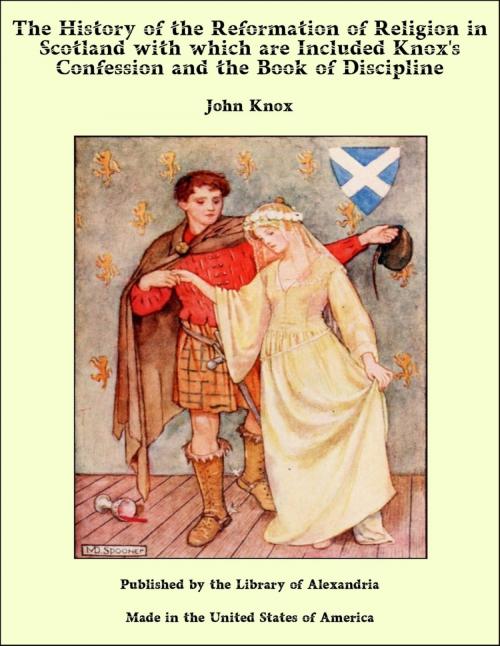The History of the Reformation of Religion in Scotland with which are Included Knox's Confession and the Book of Discipline
Nonfiction, Religion & Spirituality, New Age, History, Fiction & Literature| Author: | John Knox | ISBN: | 9781465627865 |
| Publisher: | Library of Alexandria | Publication: | March 8, 2015 |
| Imprint: | Language: | English |
| Author: | John Knox |
| ISBN: | 9781465627865 |
| Publisher: | Library of Alexandria |
| Publication: | March 8, 2015 |
| Imprint: | |
| Language: | English |
Knox's "History" has all the essential qualities of a classic. It makes appeal with perennial freshness to the heart of man. It depicts a struggle for religious freedom which never had an equal, either before or since, and yet has a counterpart in the experience of every age. It is the honest and truthful record of one of the most highly energised men that ever crossed the stage of life—a record, withal, so masterly that the reader's mind and heart attain the writer's meaning and point of view, at a bound. Its humanity is as broad as human nature; its grasp of the eternal verities is childlike yet strong; its imagination is sane yet soaring. The literary and historical value of the "History" has been adequately estimated for us by Carlyle, in his "Essay on the Portraits of John Knox;" and here we would only emphasise its manifestation of the intellectual quality and patriotic spirit of the men who were, under God, responsible for the great reformation of religion within the realm of Scotland. Above all, we would mark the noble conception of God which possessed the hearts of the Reformers. For them, the Eternal, our God, as Knox is fond of calling Him, was a living reality; and, with holy boldness, they withstood the enemies of God, whatever the worldly position and seeming authority of these might be. God's will was supreme, and they were there to see to its execution. The sap of the Old Testament is in all their utterances. The document known as Knox's Confession of Faith, and The Book of Discipline throw further light upon the high intellectual endowments and virile faith of the Reformers. The "Confession" is of historic value. It was the recognised creed of the Reformed Church in Scotland, from 1560 until 1647, when it was unfortunately discarded for the Westminster Confession. Passages in The Book of Discipline touch the sublime. The work, as a whole, contains a complete and statesmanlike scheme for the ecclesiastical administration of the realm of Scotland, for the conduct of its schools and colleges, for the relief of its poor, and for the control of its social relations. This ideal constitution was tinkered and modified, in parts, before it secured the approval of those who had great possessions, snatched from the dispossessed "Papistical Kirk." But upon its broad framework there rest the Scotland and the Presbyterianism of which Scotsmen are justly proud to-day. Originally dictated by Knox to amanuenses at intervals, between 1559 and 1571, this "History" existed only in manuscript for many years. Copied and recopied by scribes of differing abilities and of varying bias, the traditional text became overlaid with emendations in some copies, and enfeebled by excisions and suppressions in others, while of clerical errors there is no small crop in almost every one of the extant versions. Several times in the course of the eighteenth and nineteenth centuries, one or other of these versions was printed and put forth as Knox's work. But it was only in 1846 that, as a result of the painstaking research of the notable Scottish antiquarian scholar, Dr. David Laing, a really authentic and complete version of the "History" was issued by the Wodrow Society.
Knox's "History" has all the essential qualities of a classic. It makes appeal with perennial freshness to the heart of man. It depicts a struggle for religious freedom which never had an equal, either before or since, and yet has a counterpart in the experience of every age. It is the honest and truthful record of one of the most highly energised men that ever crossed the stage of life—a record, withal, so masterly that the reader's mind and heart attain the writer's meaning and point of view, at a bound. Its humanity is as broad as human nature; its grasp of the eternal verities is childlike yet strong; its imagination is sane yet soaring. The literary and historical value of the "History" has been adequately estimated for us by Carlyle, in his "Essay on the Portraits of John Knox;" and here we would only emphasise its manifestation of the intellectual quality and patriotic spirit of the men who were, under God, responsible for the great reformation of religion within the realm of Scotland. Above all, we would mark the noble conception of God which possessed the hearts of the Reformers. For them, the Eternal, our God, as Knox is fond of calling Him, was a living reality; and, with holy boldness, they withstood the enemies of God, whatever the worldly position and seeming authority of these might be. God's will was supreme, and they were there to see to its execution. The sap of the Old Testament is in all their utterances. The document known as Knox's Confession of Faith, and The Book of Discipline throw further light upon the high intellectual endowments and virile faith of the Reformers. The "Confession" is of historic value. It was the recognised creed of the Reformed Church in Scotland, from 1560 until 1647, when it was unfortunately discarded for the Westminster Confession. Passages in The Book of Discipline touch the sublime. The work, as a whole, contains a complete and statesmanlike scheme for the ecclesiastical administration of the realm of Scotland, for the conduct of its schools and colleges, for the relief of its poor, and for the control of its social relations. This ideal constitution was tinkered and modified, in parts, before it secured the approval of those who had great possessions, snatched from the dispossessed "Papistical Kirk." But upon its broad framework there rest the Scotland and the Presbyterianism of which Scotsmen are justly proud to-day. Originally dictated by Knox to amanuenses at intervals, between 1559 and 1571, this "History" existed only in manuscript for many years. Copied and recopied by scribes of differing abilities and of varying bias, the traditional text became overlaid with emendations in some copies, and enfeebled by excisions and suppressions in others, while of clerical errors there is no small crop in almost every one of the extant versions. Several times in the course of the eighteenth and nineteenth centuries, one or other of these versions was printed and put forth as Knox's work. But it was only in 1846 that, as a result of the painstaking research of the notable Scottish antiquarian scholar, Dr. David Laing, a really authentic and complete version of the "History" was issued by the Wodrow Society.















